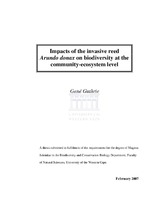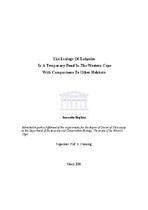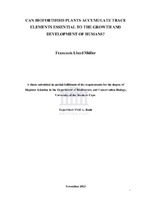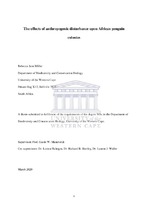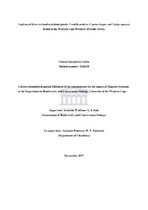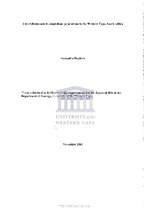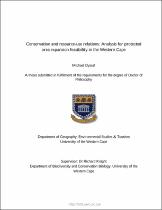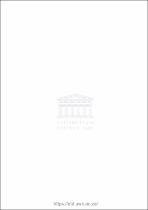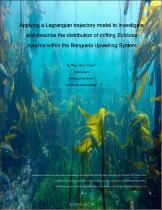Search
Now showing items 1-10 of 10
Impacts of the invasive reed Arundo donax on biodiversity at the community-ecosystem level
(University of the Western Cape, 2007)
Arundo donax is an invasive species that mostly impacts on sensitive riparian ecosystems. Arundo is also invasive in South Africa, though less is known about its ecology, biology, and impacts. Since California and the ...
The ecology of tadpoles in a temporary pond in the Western Cape with comparisons to other habitats
(University of the Western Cape, 2006)
This work centered on the tadpoles in a temporaray pond in the middle of Kenilworth racecourse, Cape Town, South Africa. Trapping was carried out over two wet seasons and five species were found. The racecourse was selected ...
Can bio fortified plants accumulate trace elements essential to the growth and development of humans?
(University of the Western Cape, 2013)
Micronutrient and trace element deficiencies are a problem affecting nearly two billion
people globally. The people affected the most by these deficiencies are those living in poor
and rural communities in the developing ...
The effects of anthropogenic disturbance upon African penguin colonies
(University of Western Cape, 2020)
African penguin (Spheniscus demersus) mainland colonies are a popular tourist attraction in the Western Cape of South Africa. The African penguin population is in decline and the species is listed as endangered on the ...
Analysis of three wetland medicinal plants: Centella asiatica, Cyperus longus and Typha capensis found in the Western Cape Province of South Africa.
(University of the Western Cape, 2017)
South Africa is recognised worldwide for its rich diversity of plants, many of which have been used in
ethno-medicine. However, the use of wetland plant species in ethno-medicine required further
investigations. This ...
Chytridiomycosis in amphibian populations in the Western Cape, South Africa
(University of the Western Cape, 2002)
There have been many cases reported of amphibian populations declining. These are often due to anthropogenic factors such as habitat destruction and pollution. However, some declines have not had an obvious cause and many ...
Conservation and resource-use relations: Analysis for protected area expansion feasibility in the Western Cape
(University of the Western Cape, 2022)
It is assumed that expanding the size and/or number of protected and conservation areas can contribute
to more effective conservation, ecosystem services and environmental protection. Expansion is
normally a response to ...
Genetic analysis of resistance to powdery mildew (podosphaeara leucotricha) in apple (Malus x dornestica Borkh.)
(University of the Western Cape, 2008)
Apple powdery mildew, caused by Podosphaera leucotricha, is one of the major diseases
of the cultivated apple in the Western Cape, causing severe losses in yield and affecting
fruit quality. This affects the deciduous ...
The water quality and ecological status of the Diep river catchment, Western Cape, South Africa
(University of Western Cape, 2004)
The study illustrates the current ecological integrity of the Diep River system,
based on the recent river health assessment using the South African Scoring
System version 5 (2000-2003) and the water quality data ...
Applying a lagrangian trajectory model to investigate and describe the distribution of drifting ecklonia maxima within the benguela upwelling system
(University of the Western Cape, 2023)
Macroalgal morphological variation is determined to a large extent by a combination of environmental factors, with wave exposure and temperature perhaps the main influences, as they are key environmental properties to which ...

